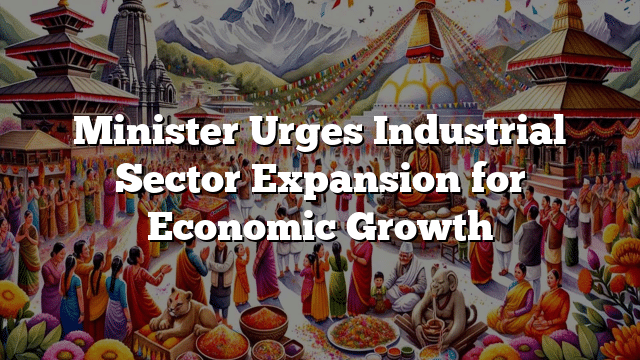
Damodar Bhandari, the Minister for Industry, Commerce, and Supplies, emphasized the importance of enhancing the industrial sector’s contribution to Nepal’s Gross Domestic Product (GDP) for economic prosperity. Speaking at the inauguration of the Make in Nepal Swadeshi Summitr-2024, organized jointly by the Confederation of Nepalese Industries (CNI) in collaboration with the Ministry of Industry, Commerce, and Supplies, Minister Bhandari highlighted the necessity of increasing the industrial sector’s role in driving the economy forward.
Minister Bhandari stressed that economic prosperity hinges on the industrial sector’s growth and its contribution to the GDP. Currently, the industrial sector’s contribution to the GDP stands at less than 5 percent, a significant decrease from its previous level of about 14 percent. To reverse this trend, Minister Bhandari advocated for fostering cooperation between the government and the private sector to promote industrial growth.
He emphasized the need to promote domestic industries utilizing local resources to bolster production and consumption of local goods. Minister Bhandari assured that provisions supporting domestic industries would be incorporated into the upcoming budget, with a commitment to prioritize the industry’s development. He also pledged personal efforts to advance this agenda.
Furthermore, Minister Bhandari underscored the importance of collaboration between the government and the private sector to attract both foreign and domestic investment in the industrial sector. He called upon the private sector to play a crucial role in encouraging foreign investors based on their expertise in promoting industrial investment.
Appreciating the CNI’s role in industrial promotion, Minister Bhandari expressed gratitude for its efforts in facilitating government policies’ implementation and enhancing industrial growth.
In his remarks, former vice-chairman of the National Planning Commission (NPC), Dr. Biswo Nath Poudel, emphasized the significance of ensuring access to raw materials, effective labor policies, capital, and market access for industrial development. He advocated for focusing on industries based on locally available raw materials to boost local production and foster economic self-reliance.
President of CNI, Rajesh Kumar Agrawal, urged the government to streamline taxes and reduce the minimum transaction limit to enhance the competitiveness of Nepali goods against Indian products. He emphasized the importance of encouraging domestic consumption of locally produced goods to build a self-sufficient and production-oriented economy.
The event highlighted the collective efforts of the government and industry stakeholders in promoting industrial growth and fostering economic self-reliance through the Make in Nepal-Swadeshi campaign.
Related:



